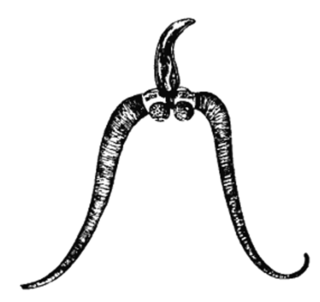Quadrigyridae is the only family within Gyracanthocephala, an order of parasitic worms of class Eoacanthocephala. This family contains two subfamilies, ten genera and about 92 species.

Acanthocephalus is a genus of parasitic worms. One of the species in this genus is Acanthocephalus anguillae, a fish parasite. Acanthocephalans are also found in humans and primates, causing a common zoonotic infection called "human acanthocephaliasis". While pathogens can be transferred among animals and humans, the main source of human acanthocephaliasis is the diet of infected raw fish and insects. Because they are lacking circulatory, respiratory, and digestive systems, Acanthocephalus are exceptionally well-adapted to a symbiotrophic existence.

Cavisomidae are a family of parasitic worms from the order Echinorhynchida.

Neoechinorhynchidae is a family of parasitic worms from the order Neoechinorhynchida.

Rhadinorhynchidae is a family of parasitic worms from the order Echinorhynchida.

Bucephalus is the genus name for many trematode flatworms that are parasites of molluscs and fish. Like other Bucephalidae, they are found in fish both as adults and as metacercariae. In marine and freshwater teleosts, they live as parasites inside the digestive tract, especially the intestine.

Bucephalidae is a family of trematodes that parasitize fish. They lack suckers, having instead a muscular organ called a "rhynchus" at the front end which they use to attach to their hosts. The characteristics of the rhynchus are used to help define the genera of the family. It is one of the largest digenean families, with 25 genera containing hundreds of described species. Bucephalids are cosmopolitan, having been recorded all over the world. They are parasites of fish from freshwater, marine, and brackish water habitat types.

Opecoelidae is a family of trematodes. It is the largest digenean family with over 90 genera and nearly 900 species, almost solely found in marine and freshwater teleost fishes. It was considered by Bray et al. to belong in the superfamily Opecoeloidea Ozaki, 1925 or the Brachycladioidea Odhner, 1905.
Coitocaecum is a genus of trematodes in the family Opecoelidae. It has been synonymised to Ozakia Wisniewski, 1934, Paradactylostomum Zhukov, 1972 nec Toman, 1992, and Pseudocoitocaecum Bilqees, 1972.
Dactylostomum is a genus of trematodes in the family Opecoelidae. It is synonyised with Opedunculata Dwivedi, 1975.
Decemtestis is a genus of trematodes in the family Opecoelidae. It has been synonymised with Allodecemtestis Hafeezullah, 1970.
Opecoeloides is a genus of trematodes in the family Opecoelidae. It has been synonymised with Cymbephallus Linton, 1934 and Fimbriatus von Wicklen, 1946.
Opecoelus is a genus of trematodes in the family Opecoelidae.
Opegaster is a genus of trematodes in the family Opecoelidae.
Pseudopecoelus is a genus of trematodes in the family Opecoelidae. It has been synonymised with Neopecoelus Manter, 1947.
Transversotrematidae is a family of trematodes in the order Plagiorchiida. It is the only family in the superfamily Transversotrematoidea, which is the only superfmaily in the suborder Transversotremata. It has been synonymised with Circuitiocoeliidae Wang, 1981, Squamacolidae Pan & Wang, 1985, and Transversotrematinae Witenberg, 1944.
Caudotestis is a genus of trematodes in the family Opecoelidae.

Ancyrocephalidae is a family of monogenean flatworms. The family is considered as a "temporary name" in WorMS but includes a large number of genera and species.
Batrachotrematidae is a family of trematodes in the order Plagiorchiida.
Batrachotrema is a genus of trematodes in the family Batrachotrematidae. It is the type-genus of the family, and its type-species is B. petropedatis. The type-species is the only species of the family found in Africa, and this distinction has led Cribb (2005) to consider that a family-level distinction may be needed between B. petropedatis and other species of Batrachotrematidae; however, molecular testing will be needed to decide this point. Batrachotrema also contains B. pseudobagri, the only species of Batrachotrematidae which is parasitic in a fish, rather than in frogs.






